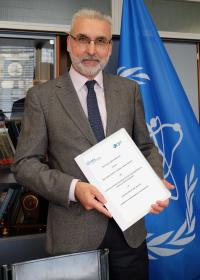(1) The ITER Project, the Broader Approach Activities
Japan together with China, the European Atomic Energy Community (EURATOM), India, Korea, Russia and the United States are now engaged in the ITER Project, a collaboration to build an experimental fusion reactor in France to prove production of 500 MW of fusion power for the first time in the world. On October 24, 2007, the ITER Agreement (Agreement on the Establishment of the ITER International Fusion Energy Organization for the Joint Implementation of the ITER Project) entered into force. QST has been responsible to implement this ITER project.
Japan and EURATOM are jointly implementing the Broader Approach (BA) Activities, which complement the ITER Project, for early realization of demonstration fusion reactors that will demonstrate electricity generation. On June 1, 2007, the Broader Approach Agreement (Agreement between the Government of Japan and the European Atomic Energy Community for the Joint Implementation of the Broader Approach Activities in the Field of Fusion Energy Research) entered into force. QST has been responsible to implement these BA Activities.
Japan and EURATOM are jointly implementing the Broader Approach (BA) Activities, which complement the ITER Project, for early realization of demonstration fusion reactors that will demonstrate electricity generation. On June 1, 2007, the Broader Approach Agreement (Agreement between the Government of Japan and the European Atomic Energy Community for the Joint Implementation of the Broader Approach Activities in the Field of Fusion Energy Research) entered into force. QST has been responsible to implement these BA Activities.
Related Resources
(2) IAEA Collaborating Centre (IAEA-CC)
An IAEA Collaborating Centre (IAEA-CC) is an institution designated by the IAEA to support the IAEA’s programmatic activities.
As of August 2019, 37 IAEA-CCs are operating in various areas related to the safe, secure and peaceful application of nuclear science and technology in the world.
On September 22, 2022, QST was re-designated as an IAEA-CC for the next 4 years to implement the agreed work plan for sharing scientific knowledge and human resources development in the following fields.
1) Radiation Oncology
2) Nuclear Medicine and Molecular Imaging
3) Dosimetry
4) Science, Technology and Society
As of August 2019, 37 IAEA-CCs are operating in various areas related to the safe, secure and peaceful application of nuclear science and technology in the world.
On September 22, 2022, QST was re-designated as an IAEA-CC for the next 4 years to implement the agreed work plan for sharing scientific knowledge and human resources development in the following fields.
1) Radiation Oncology
2) Nuclear Medicine and Molecular Imaging
3) Dosimetry
4) Science, Technology and Society
Related Resources
(3) IAEA Capacity Building Centre (IAEA-CBC)
An IAEA Capacity Building Centre (IAEA-CBC) is an organization or a group of organizations with capabilities to implement education, training or information sharing for emergency preparedness and response (EPR), which is designated by the IAEA.
QST was designated as an IAEA-CBC from 2017 and re-designated in the field of medical management of radiation exposures and dose assessment on November 4, 2020 for the next 5 years. QST will continuously host several IAEA training courses and fellowships under this framework.



(left: Mr. Juan Carlos Lentijo, Deputy Director General, IAEA)
(middle: Plaque of IAEA-CBC Designation)
(right: Mr. Noda Koji, Executive Director, QST)
Related Resources
(4) WHO Collaborating Centre (WHO-CC)
WHO Collaborating Centres (WHO-CC) are research institutes designated by the WHO to support the WHO's programmes. Over 800 WHO-CCs in over 80 Member States are working on areas such as nursing, occupational health, communicable diseases, nutrition, mental health, chronic diseases and health technologies as well as radiation emergency medicine.
QST was re-designated as a WHO-CC on September 2, 2021 for the next 4 years to implement the agreed work plan in the following fields.
1) Public health preparedness and response to radiation emergency
2) Radiation safety in healthcare settings
3) Assessing and managing risks related to radation exposure through inhalation and ingestion
QST was re-designated as a WHO-CC on September 2, 2021 for the next 4 years to implement the agreed work plan in the following fields.
1) Public health preparedness and response to radiation emergency
2) Radiation safety in healthcare settings
3) Assessing and managing risks related to radation exposure through inhalation and ingestion
